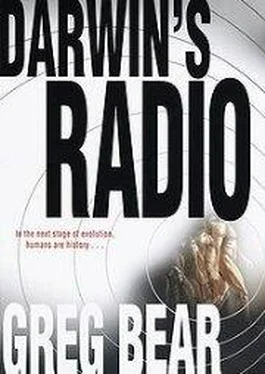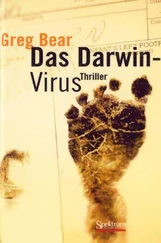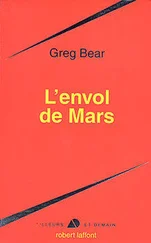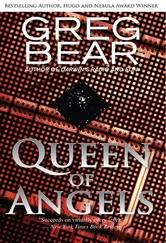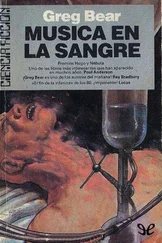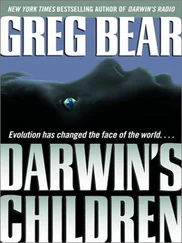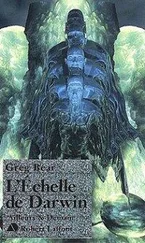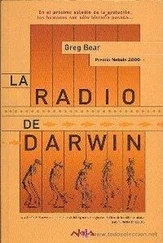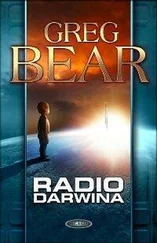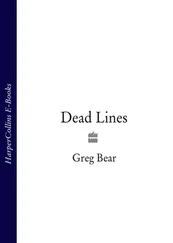“I can see it in your skin. I can smell it.”
“I bet you can,” she said admiringly. “Can you smell anything else?” She pushed closer to him, lifted over his head, swung her knee to the other side.
“Spring,” Mitch said, returning the favor.
She arched her back, half-twisted, and deftly fondled him, as he nuzzled between her legs.
“Ballet dancer,” Mitch said, his voice muffled.
“You’re fertile, too,” she said. “You didn’t say otherwise.”
“Mm.”
She lifted her torso again, rolled off him, and swung around to face him. “You’re shedding,” she said.
Mitch screwed up his face in puzzlement. “What?”
“You’re shedding SHEVA. I test positive.”
“Good Christ, Kaye. You sure know how to trash a mood.” Mitch pushed back and sat with his legs pulled up in the corner of the tent. “I didn’t think it could happen so fast.”
“Something thinks I’m your woman,” Kaye said. “Nature says we’re going to be together a long time. I want that to be true.”
Mitch was at a complete loss. “I do, too, but we don’t need to act like idiots.”
“Every man wants to make love to a fertile woman. It’s in their genes.”
“That is complete bullshit,” Mitch said, and pushed back from her. “What in hell are you doing?”
Kaye hunkered across from him and rested on her knees. She made his head throb. The entire tent smelled of both of them and he could not think straight. “We can prove them wrong, Mitch.”
“About what?”
“I once worried that work and family wouldn’t fit together. Now, there’s no conflict. I am my own laboratory.”
Mitch shook his head vehemently. “No.”
Kaye lay down beside him, pillowing her head on her arms. “Pretty forward and up front, no?” she asked softly.
“We haven’t the slightest idea what’s going to happen,” Mitch said. His eyes were brimming, warm, half from fear, half from another emotion he could not define — something close to pure physical joy. His body wanted her so intensely, wanted her now. If he gave in, he knew it would be the supreme sexual act of his entire life. And if he gave in now, he worried he would never forgive himself.
“I know you believe we’re right, and I know you’d be a good father,” Kaye said, eyes narrowed to slits. She slowly lifted one leg. “If we don’t do something now, maybe it will never happen, and we’ll never know. Be my man. Please.”
The tears came in a rush and Mitch hid his face. She rose beside him and held him and apologized, feeling his shaking. He mumbled a confused and jerking series of words about how women simply did not understand, never could understand.
Kaye soothed him and lay down beside him and for a while the breeze blew the rain flap gently over their silence.
“It’s nothing wrong,” she said. She wiped his face and looked down on him, frightened at what she had provoked. “It’s the only right thing there is, maybe.”
“I’m sorry,” Kaye said stiffly as they loaded the car. A cool current of morning air slopped up from the flat farmland below the campsite. The leaves on the oak trees whispered. The tractors stood motionless on their perfect and empty furrows.
“No reason to be sorry,”Mitch said, shaking out the tent. He folded it and rolled it into its long fabric sheath, then, with Kaye’s help, unsocketed the tent poles and clapped them together into a fasces connected top to bottom by their stretching cords.
They had not made love during the night, and Mitch had slept very little.
“Any dreams?” Kaye asked as they sipped hot coffee from the pot on the camp stove. Mitch shook his head. “You?”
“I didn’t sleep more than a couple of hours,” Kaye said. “I dreamed of working at EcoBacter. All these people were coming in and out. You were there.” Kaye did not want to tell Mitch that in the dream she did not recognize him.
“Not very exciting,” Mitch said.
As they traveled, they saw little out of the ordinary, out of place. They drove west on the two-lane road through small towns, coal towns, old towns, tired towns, towns repainted and repaired, gussied up, with their grand old homes in the rich old neighborhoods made into bed-and-breakfasts for well-to-do young people from Philadelphia and Washington and even New York.
Mitch switched on the radio and they heard about candlelight vigils in the Capitol, ceremonies honoring the dead senators, funerals for others killed in the riot. There were stories on the vaccine effort, how scientists now believed the torch had been passed to James Mondavi or perhaps a team at Princeton. Jackson seemed on the descent, and despite all that had happened, Kaye felt sorry for him.
They ate at the High Street Grill in Morgantown, a new restaurant designed to look old and established, with Colonial decor and thick wood tables coated with clear plastic resin. The sign out front declared the restaurant to be “Just a bit older than the Millennium, and a hell of a lot less significant.”
Kaye watched Mitch closely as she picked at her club sandwich.
Mitch avoided her gaze and looked around at the customers, all stolidly involved in fueling their bodies. Older couples sat in silence; a lone man dropped his wool cap on the table next to a foam cup of coffee; three teenage girls in a booth picked at sundaes with long steel spoons. The staff was young and friendly and none of the women wore masks.
“Makes me believe I’m just an ordinary guy,” Mitch said quietly, looking down at the bowl of chili before him. “I never thought I’d make a good father.”
“Why?” Kaye asked, equally quiet, as if they were sharing a secret.
“I’ve always focused on my work, on wandering around and going places where there was interesting stuff. I’m pretty self-centered. I never thought any intelligent woman would want me to be a father, or a husband, for that matter. Some made it perfectly clear that wasn’t why they were with me.”
“Yeah,” Kaye said, completely tuned in on him, as if every word might contain an answer essential to solving something that puzzled her.
The waitress asked if they needed more tea or dessert. They declined.
“This is so ordinary,” Mitch said, lifting his spoon and swinging it through a small arc to measure the restaurant. “I feel like a big bug in the middle of a Norman Rockwell living room.”
Kaye laughed. “There,” she said.
“What do you mean, ‘there’?”
“That was you, saying that. And I just felt my insides quiver.”
“It’s the food,” Mitch said.
“It’s you.”
“I need to be a husband before I can be a father.”
“It certainly isn’t the food. I’m shaking, Mitch.” She held out her hand and he let go of the spoon to grasp it. Her fingers were cold and her teeth were chattering though the interior was warm.
“I think we should get married,” Mitch said.
“That’s a lovely idea,” Kaye said.
Mitch held out his hand. “Will you marry me?”
Kaye held her breath for a moment. “Oh, God, yes,” she said with a short puff of resolve.
“We’re crazy and we don’t know what we’re in for.”
“We don’t,” Kaye agreed.
“We’re on the edge of trying to make someone new, different from us,” Mitch said. “Don’t you find that terrifying?”
“Utterly,” Kaye said.
“And if we’re wrong, it’s just going to be disaster after disaster. Pain. Grief.”
“We are not wrong,” Kaye said. “Be my man.”
“I am your man.”
“Do you love me?”
“I love you in ways I’ve never felt before.”
“So fast. That’s incredible.”
Mitch nodded emphatically. “But I love you too much not to be a little critical.”
Читать дальше
Конец ознакомительного отрывка
Купить книгу
